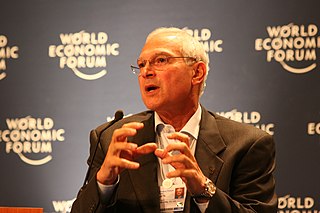A Quote by Jamshyd Godrej
Sometimes, we use the term 'growth' as a number and sometimes as an abstraction, but the underlying implication is always that, if the country grows at a certain rate, at the end there will be a pot of gold for everyone.
Quote Topics
Related Quotes
I advise other companies' CEOs, don't fall into the trap where you go, 'Where's the growth? Where's the growth?' Where's the growth?' They feel a tremendous pressure to grow. Well, sometimes you can't grow. Sometimes you don't want to grow. In certain businesses, growth means you either take on bad clients, excess risk, or too much leverage.
People get sick and sometimes they get better and sometimes they don't. And it doesn't matter if the sickness is cancer or if it's depression. Sometimes the drugs work and sometimes they don't. Sometimes the drugs work for a while and then they stop. Sometimes the alternative stuff works and sometimes it doesn't. And sometimes you wonder if no outside interference makes any difference at all; if an illness is like a storm, if it simply has to run its course and, at the end of it, depending on how robust you are, you will be alive. Or you will be dead.
I think there has to be an underlying sexuality. There has to be a perverseness to the clothes. There is a hidden agenda in the fragility of romance. It's like a Story of O. I am not big on women looking naive. There has to be a sinister aspect, whether it's melancholy of sadomasochist. I think everyone has a deep sexuality, and sometimes it's good to use a little of it-and sometimes a lot of it-like a masquerade.
The strange thing about the apocalypse is that it's uneven. For some people, it goes one way and for others another way, so that there's always this shifting relation to the narrative of the disaster. Sometimes apocalypses are just structural fictions, and sometimes they're real. Sometimes a narrative requires an end - the fact that the beginning was always leading somewhere becomes clear at the end. There's an idea that we're always in the middle, but we posit this apocalyptic end in order to also be able to project into the past or the beginning. I think that's true and false.
It hasn't always been easy. There's a lot of hard moments. Sometimes you learn from the end of the bench. Sometimes you learn from injuries. Sometimes you learn the most through the hard things. If you can keep a good attitude and keep on working, eventually situations change, and you can put those things to use.
The rate of growth of the relevant population is much greater than the rate of growth in funds, though funds have gone up very nicely. But we have been producing students at a rapid rate; they're competing for funds and therefore they're more frustrated. I think there's a certain sense of weariness in the intellectual realm, it's not in any way peculiar to economics, it's a general proposition.
Criticism of growth arose with the discovery that growth beyond a certain point is destructive of the earth. We are already using resources much faster than they can be replenished. We are producing wastes much faster than nature's sinks can process them. The growth economy will end. The only questions are when its end will come, and whether humanity will be able to survive its demise.



































